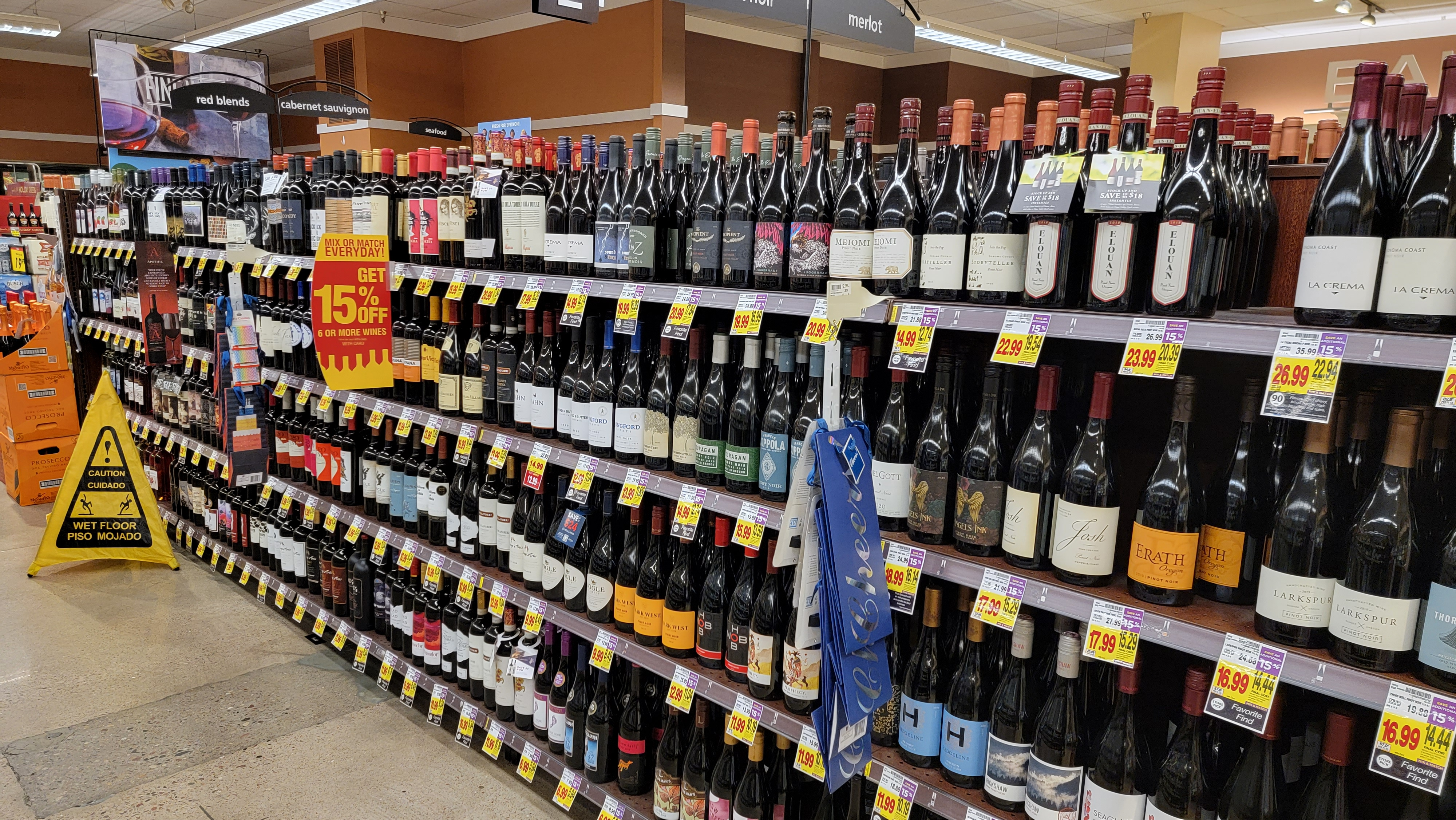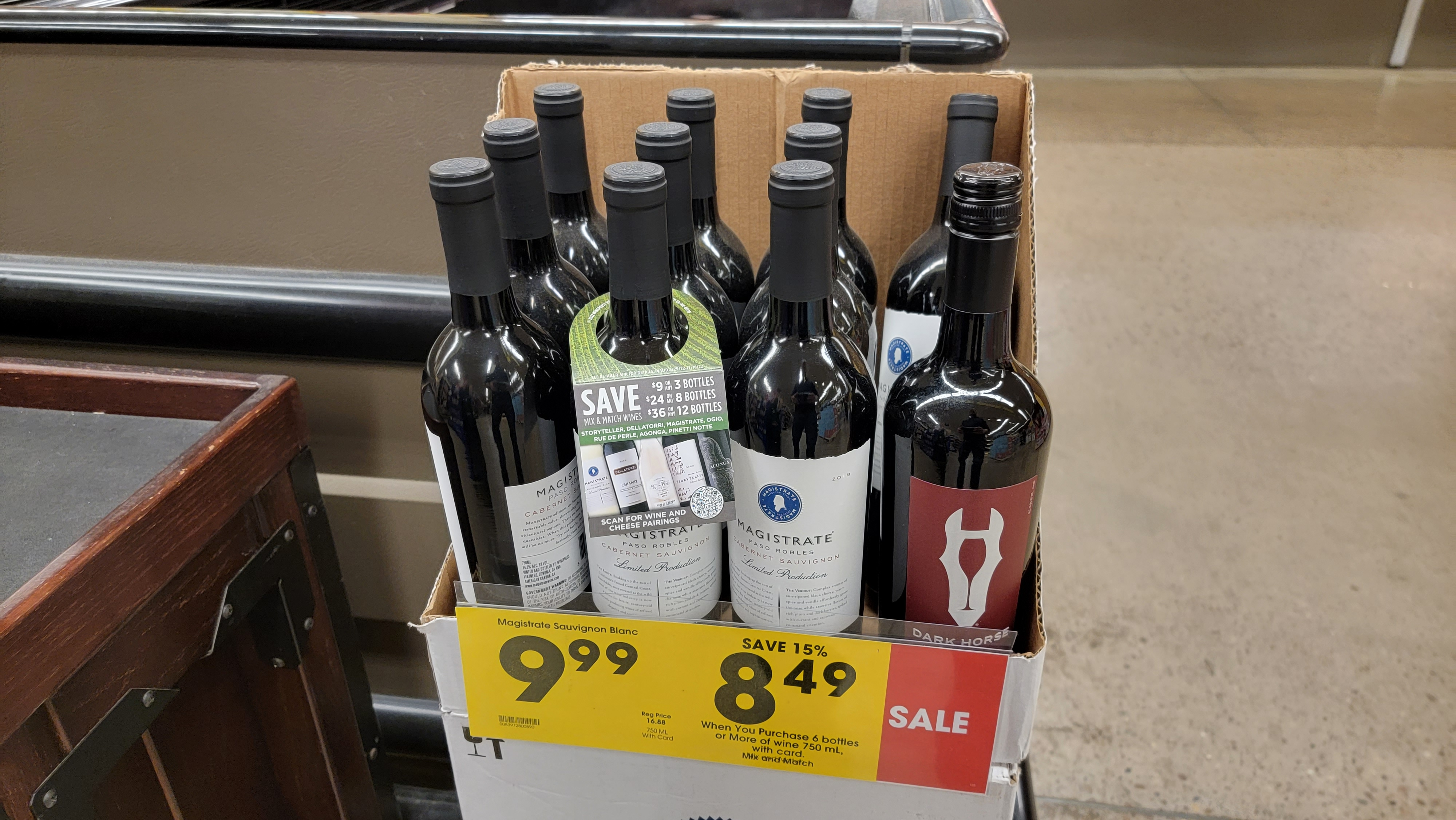How To Avoid The Worst Wines At The Grocery Store
Skip the hot and fuzzy flavors of spoiled wine with these shopping tips.
Dinner is ready, the table is set, and you pop the cork on that bottle of wine you picked up (on sale!) at the grocery store. But after one sip, you realize something is wrong. The flavors are musty, sharp, or strangely hot and alcoholic. And are reds supposed to be carbonated?
I'm not a wine expert by any means. But as someone who both enjoys a regular glass and has worked in food supply/retail, I'm intimately familiar with the situation above. I've seen things, man, from cases stored against heating pipes to a cabernet that foamed from its bottle.
Temperature, backroom storage, and the dangers of unintended secondary fermentation are just a few of the factors that can impact the taste of your purchase. But with a little attention to detail, you can increase your chances of picking a good bottle, even at a small-town shop.
Pay attention to the wine storage and surroundings
In southern Wisconsin, there's a grocery store with an impressive selection of wines. In fact, booze has its own separate section of the building, offset to the right when you enter the store. When you walk in and see row upon row of bottles, it's hard not to be impressed.
But you know what else this particular venue has? Windows. Tall ones, and lots of them. And for a good portion of the day, the bright sun slants through the glass, falling directly on those well-manicured shelves.
Over my first few months in the area, I purchased several wines from this location. And each and every one tasted off. Then, on a midday shopping trip, I lifted a bottle to discover that it was warm to the touch. This is no good. Any kind of storage that involves direct sunlight or radiant heat—even if it's from nearby coolers or freezers—is decidedly less than ideal.
Focus on younger vintages
This one took a while to sink in. Because, come on, we've all heard the rule of thumb: Wine gets better with age, right? Well, yes, so long as it's properly stored. And if you're shopping at the average grocery store, chances are that there's no such storage space for wine, meaning that those four-, six-, or ten-year-old bottles you might spot on the shelf probably haven't been tucked away in a temperature-controlled wine cellar. Instead, those wines have been in the back of a warehouse, in a musty cardboard box shoved against a hot wall, forgotten behind a pallet of holiday décor. Sound a bit far-fetched? I've seen it!
Think of it this way: The more current the date on the bottle, the less time it has had to sit around in sub-optimal conditions. And if you're shopping in the under-$20 range (and with most grocers, you should be), there probably won't be a huge difference in flavor between a 2016 and a 2021, even under the best of circumstances. If you want to go vintage, liquor stores and specialty shops will be far and away the better bet.
Beware the bargain table
Exercise caution when it comes to deals and sales. While there are certainly bargains to be found, experience has taught me that a discounted bottle of wine comes with a better chance of getting skunked.
Stop and ask yourself: Why is this bottle on sale? Chances are, it's a matter of grocery store logistics. Suppliers might find themselves with a glut of a poorly selling product and need to clear their warehouses before the new vintage comes in. Or it might be a discount on the grocery side: There's only so much space in the back room between the recalled household cleaners and the moldering potatoes, and the easiest way to clear that space is to slap a "SALE!" tag on the bottles and toss them on the shelves.
Again, I've seen this happen, and I should have known better than to buy. But in college, money is tight, and we don't always make the best decisions. It's an extreme example, for sure, but the memory (and flavor) still lurks in the back of my mind. Hard liquors and even beers can be tasty when purchased for half off. But discount grocery store wine is more of a gamble.
Find and support a store that you trust
Every rule has exceptions, including the ones listed above. In fact, I'd go so far as to say that most grocers aren't actively trying to pass off an inferior product. Sure, there are particular stores where I avoid purchasing wine, and suggest you do the same. But even in these cases, I think it's a lack of knowledge and insufficient facilities that bring bad wine to the shelves, not greed-motivated scamming. Working in food retail is hard, and you get by with the tools that you're given.
Thankfully, my local ALDI is excellent. And if you find a grocer that sells consistently good-tasting wine, then celebrate! Show your thanks by stocking up, and maybe dropping a "kudos" for their selection. Workers and businesses that peddle quality products deserve their time in the sun. But not the wine—keep those bottles in a cool, dark place.

